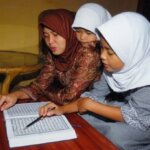Physical exhaustion is a common challenge faced during periods of intense memorization. However, it’s essential to address fatigue, particularly when it seems unusual, as it may signal underlying health issues. This is even more crucial when memorizing the Quran, requiring high concentration to engrain verses deep within the mind. To combat fatigue and improve mental alertness during Quranic studies, this article will discuss various methods of physical training.
Before we delve into these strategies, it’s important to understand the potential causes of physical fatigue, which may be related to health concerns. Here are some key factors:
- Lack of Sleep.
- Sleep Apnea (a sleep disorder marked by repeated breathing difficulties).
- Energy Deficiency.
- Anemia.
- Depression.
- Hypothyroidism.
- Excessive Caffeine Consumption.
- Urinary Tract Infections.
- Diabetes.
- Dehydration.
- Heart Conditions.
- Disrupted Sleep Patterns Due to Shift Work.
- Food Allergies.
- Fibromyalgia and Chronic Fatigue Syndrome.
Understanding these potential causes, we can now explore strategies to train physically and combat fatigue:
1. Physical Exercise
Engage in regular physical exercise if you generally feel healthy but experience undue fatigue. Cycling on a stationary bike for approximately 20 minutes or morning jogging in a park can strengthen your physical endurance. Exercise not only enhances physical health but also rejuvenates your mental faculties. Aim for at least three sessions per week.
Light physical activities like aerobics or fitness therapy can also be effective in building physical stamina, reducing the likelihood of fatigue during tasks requiring high levels of concentration.
2. Hydration
Your body requires at least two liters of water daily. Considering that approximately 80% of the human body consists of fluids, maintaining proper hydration is vital. Stick to regular water consumption instead of relying on supplemental drinks.
Intensive activities require more fluids; inadequate hydration can hamper concentration. To avoid dehydration affecting your memorization sessions, ensure you meet your daily hydration needs.
3. Consistent Sleep Patterns
While your body works, it also requires adequate rest. Establishing a consistent and restful sleep schedule is crucial to maintaining stamina and remaining refreshed throughout daily routines. An ideal sleep pattern consists of approximately eight hours at night and a one-hour nap during the day.
Lack of sufficient nighttime sleep can result in daytime sluggishness, while excessive sleep may lead to headaches. However, be mindful of potential sleep disorders such as sleep apnea, characterized by recurrent breathlessness during sleep. This condition can disrupt your rest even if you sleep for eight hours, causing inadequate rejuvenation.
4. Balanced Nutrition
Ensuring you have a balanced diet is crucial for maintaining physical endurance. A well-rounded diet includes an adequate amount of nutrients, vitamins, and carbohydrates, promoting balanced absorption in the body. In addition to staple foods and proteins, include fresh vegetables and fruits that offer various health benefits.
Certain vegetables and fruits are particularly beneficial for your health. For instance, legumes can prevent anemia, as they help boost red blood cell production. Moreover, be cautious about excessive sugar consumption, which may lead to undiagnosed mild diabetes. Avoid excessive caffeine intake, as it can negatively affect your body, interfering with sleep patterns and potentially causing depression.
Some people have food allergies. Surprisingly, coconut water or “degan wulung” can be an effective natural remedy for food allergies. This means that food allergies can be addressed not just with medications but also through natural remedies.
5. Multivitamins
If you maintain regular exercise, sleep patterns, and a balanced diet but still suffer from frequent fatigue, you might be experiencing acute fatigue syndrome or hypothyroidism. Symptoms are similar, including fatigue, dull skin, hair loss, and other health issues, potentially affecting the effectiveness of your Quranic memorization.
To combat acute fatigue syndrome and hypothyroidism, consider multivitamin supplements rich in vitamins A, E, and D. Include sea vegetables and seaweed in your diet to ensure a sufficient nutrient intake.
These strategies for physical training can be beneficial before embarking on Quranic memorization. Additionally, it’s essential to practice controlled breathing to prevent interruptions in your recitation. Stopping at the wrong place in a verse can alter its meaning. These recommendations aim to help you prepare effectively for Quranic memorization. Thank you.







